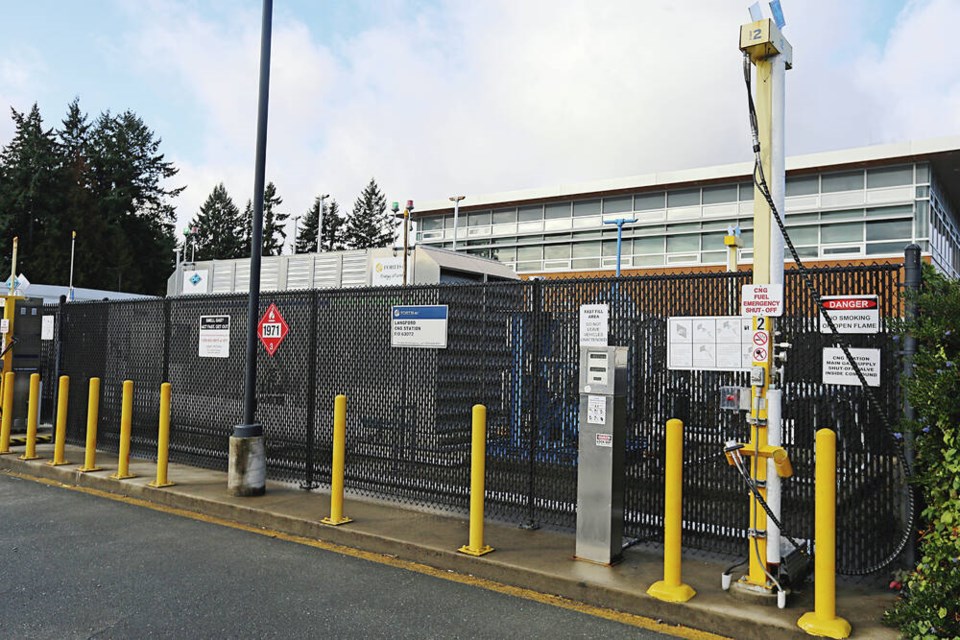Nanaimo council has given third reading to a bylaw to prohibit natural gas as the main heat source in new housing, meaning the new rule will likely be approved when it returns for fourth and final reading on Oct. 16.
Once passed, the bylaw will come into effect next July, ahead of a 2030 provincial target for the highest levels of its zero-carbon rule for new homes, called the “step code.”
Nanaimo has become a lightning rod in the province for the controversial issue of banning natural gas as a primary heating source, even though other municipalities, such as Victoria and Saanich, have already approved earlier adoption of zero-carbon rules and others are considering it.
When Nanaimo council initially voted on the issue last month, the result was close, at five to four. Monday’s vote was five to three, with one member absent. No one had changed their vote, despite a large volume of letters from both sides. Opponent letters came from the Alberta-based Canadian Energy Centre as well as the Hearth Patio and Barbecue Association of Canada, which drew up a letter for a Nanaimo businessman.
Nanaimo Coun. Hilary Eastmure, who is in favour of bringing in the new rules earlier, said Friday she received 519 letters in favour of the move, some via a local climate action group, and 403 letters opposed in the past week. Those in favour came in over a longer period and were more likely to have included information about where the writers live, she said.
Victoria Mayor Marianne Alto spoke in favour of Nanaimo’s position Thursday. “I’m distressed that cities making responsible decisions in favour of their residents are being harassed for such thoughtful decisions,” she said in a statement. “As municipalities in B.C. grapple with challenging climate action decisions, it’s important they be able to do so without outside interference.”
During Monday’s discussion in Nanaimo, Coun. Ben Geselbracht said the new bylaw is one way for the city to take responsibility for its fair share of emissions reduction.
He said extreme weather associated with climate change, such as floods, fires and heat domes, is resulting in “significant cost challenges” for municipalities. “We are spending more on emergency management and also [on] municipal infrastructure that we are having to upgrade to deal with these extreme weather events,” he said.
Coun. Tyler Brown also backed the bylaw, saying it’s “up to us and many others to do their part.”
But Coun. Janice Perrino said next year is too soon to put the bylaw in effect, calling it “overstepping our role.” She said council’s role is to support businesses, something the proposed bylaw does not do.
In the end, councillors Perrino, Ian Thorpe and Sheryl Armstrong opposed the bylaw. Mayor Leonard Krog was not present.
The change is expected to affect 160 new single-family homes in the city each year. It does not apply to existing homes and other buildings already using natural gas.
Chris Bowen, general manager of Nanaimo’s Pioneer Fireplace and Spa, said he had collected about 400 signatures, largely from Nanaimo residents, and plans to continue his campaign against the bylaw.
The letter was drawn up for him by the Hearth Patio and Barbeque Association of Canada and he distributed it, he said this week.
It asks Nanaimo to take a second look at the issue, saying speeding up the implementation of the zero-carbon step code equates to a ban on natural gas for space and water heating in new construction. More consultation is needed, it says.
FortisBC responded to Nanaimo’s vote this week by saying that to meet provincial climate targets and maintain affordability, B.C. needs policies that support different types of energy, including both electricity and renewable natural gas and, in the future, hydrogen.
“By disregarding the voices of residents, small businesses and local industry, Nanaimo City Council has decided to pursue a policy that will limit access to low-carbon and renewable energy options that can help to lower emissions,” FortisBC said in a statement.
>>> To comment on this article, write a letter to the editor: [email protected]




